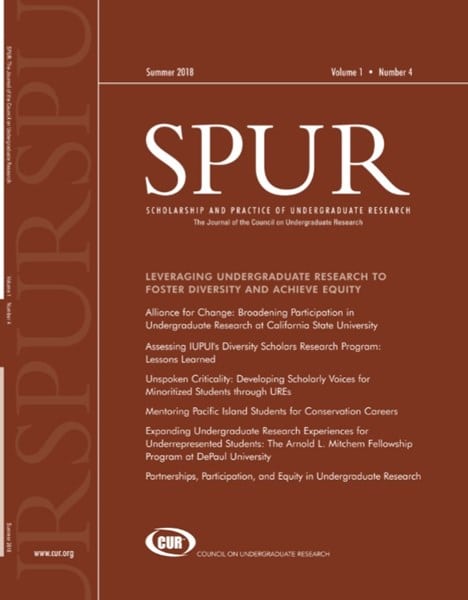SPUR (2018) 1 (4): https://doi.org/10.18833/spur/1/4/10 Abstract:
Launched in 1997, the Diversity Scholars Research Program (DSRP) is an undergraduate performance-based scholarship program that aims to attract academically talented, underrepresented minority (URM) students to the IUPUI campus. The program provides financial assistance (tuition, academic stipend, conference travel, and some housing), mentoring, professional development, and research support for up to four years. As of summer 2017, 65 percent of scholars in good standing have graduated from IUPUI. Four-year graduation rates of DSRP scholars were more than double the average graduation rates for URM students with comparable GPAs at admission. New initiatives have been implemented that include changes to the admission and selection process, additional support to first-year students, and improvement of communication between all stakeholders.
More Articles in this Issue
- Assessment‐ John E. Banks, Carla Fresquez, Heather Haeger, Semarhy E. Quinones-Soto, and Lisa Hammersley
SPUR (2018) 1 (4): https://doi.org/10.18833/spur/1/4/9 Abstract:Engagement in high-impact practices such as undergraduate research can dramatically improve academic and developmental outcomes; traditionally underserved students (including underrepresented minorities and firstgeneration students) often experience outsized benefits from these academic experiences. The California State University Louis Stokes Alliance for Minority Participation (CSU–LSAMP) program provides wide-ranging scaffolding and support to underrepresented students, seeking to increase the participation of individuals who face or have faced social, educational, or economic barriers to careers in science, technology, engineering, and math (STEM). The authors provide a description of the undergraduate research and supplementary programs supported by the CSU–LSAMP program at California State University Monterey Bay and other CSU campuses and present outcome data highlighting the benefits of leveraging undergraduate research engagement to increase participation of underserved groups in STEM.
- Article‐ Susan G. Mendoza and Dave A. Louis
SPUR (2018) 1 (4): https://doi.org/10.18833/spur/1/4/7 Abstract:The authors reflect on their work in designing, executing, and evaluating undergraduate research experiences (UREs) that serve students of color, first-generation students, and low-income students. They assert that additional support is needed to prepare students as their cultures and identities intersect with their disciplinary learning and the historical context of the academy. The authors discuss the meaning of scholarly voice, the influence of minoritized cultures on that voice, the integration of their scholarly voice within the discipline, elements of programmatic design that intentionally create space, and experiences that promote a reflective scholarly journey for students. By infusing these elements into the faculty repertoire when mentoring students in UREs and into the framework and culture of UREs, students will be able to actively engage in graduate education from a place of integration and resiliency
- Practice‐ Noelani Puniwai-Ganoot, Sharon Ziegler-Chong, Rebecca Ostertag, and Moana Ulu Ching
SPUR (2018) 1 (4): https://doi.org/10.18833/spur/1/4/11 Abstract:The Pacific Internship Programs for Exploring Science (PIPES) link undergraduates to environmental careers and mentor the next generation of scientists, educators, and managers for Hawaiʻi and the Pacific. PIPES uses formal and informal educational frameworks to deepen a sense of kuleana (responsibility) and provide opportunities for engagement in research and conservation practices in a higher education setting. Each summer, 30 to 40 students participate in an intensive, full-time, paid internship program for 10 weeks; 580 undergraduates have completed the program to date. These immersive experiences in science, natural resource management, environmental education, and Hawaiian values help ground interns in the intent of their daily work and provide rich opportunities to develop a deep connection to field sites and organizations.
- Practice‐ Terry Vaughan III, Maria Mendez, and Luciano Berardi
SPUR (2018) 1 (4): https://doi.org/10.18833/spur/1/4/12 Abstract:In 2011, DePaul University established the Arnold L. Mitchem Fellowship Program to support graduate school preparation for first-generation, low-income, and underrepresented second-year students. The program aims to advance students’ academic and career paths through an early research experience where students create literature reviews that reflect their lived experiences, are critical of society, and motivate them to pursue avenues of inquiry within their fields. The program also serves as a pathway for students interested in the federally funded McNair Scholars Program at DePaul. By participating in the Mitchem Program, students can enhance their academic profiles in preparation for future undergraduate research opportunities and graduate school.
- Practice‐ Ted Martinez, Nena Bloom, Amy V. Whipple, and Steve Chischilly
SPUR (2018) 1 (4): https://doi.org/10.18833/spur/1/4/13 Abstract:Northern Arizona University (NAU) has been operating a National Science Foundation–funded Research Experiences for Undergraduates program for 18 years. The program works with tribal and community college faculty to recruit students traditionally underrepresented in the sciences for a 10-week summer research experience at NAU. Since 2006, 77 percent of the 83 participants have been from ethnic or racial groups underrepresented in the sciences. A total of 53 students from two-year tribal or community colleges participated, and at least 30 students (57 percent) transferred to a four-year institution. Building authentic interactions with tribal colleges and collaborations in tribal college program development, faculty development, and research programs and finding ways to encourage students to enroll in graduate school are ongoing parts of the program.
- Vignette‐ Kristin Boudreau, David DiBiasio, and Zoe Reidinger
SPUR (2018) 1 (4): https://doi.org/10.18833/spur/1/4/1 - Vignette‐ Reginald E. Rogers and Todd Pagano
SPUR (2018) 1 (4): https://doi.org/10.18833/spur/1/4/2 - Article‐ Denise Gillman, Shannon Farrow, and Danielle Hartman
SPUR (2018) 1 (4): https://doi.org/10.18833/spur/1/4/8 Abstract:For 12 years, Denise Gillman has taught the course Science on the Stage at Christopher Newport University in Newport News, Virginia. The plays studied awaken intellectual curiosity and understanding of human nature and complex scientific ideas within the framework of a good story and can do so for students of every major. This article presents how science-themed plays build interdisciplinary bridges in the classroom, create collaborative inquiry-based learning models, and launch creative research pathways for undergraduates. It explores the use of these plays as an interdisciplinary springboard by sharing exercises and writing assignments that engage various learners. It also exemplifies, through student work and two case studies, how students’ research and creative investigation of these plays have originated questions that explore urgent problems and led them into capstone experiences, research projects, and conference presentations.


